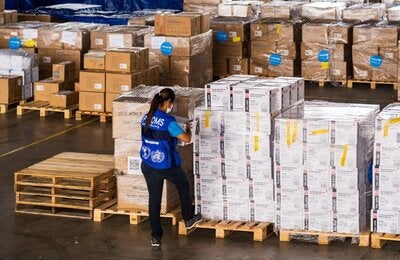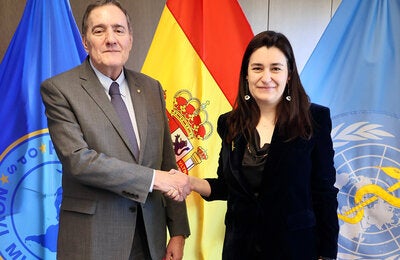

A new regional health organization, the Caribbean Public Health Agency (CARPHA), has been created by the Caribbean Community (CARICOM) with support from the Pan American Health Organization/World Health Organization (PAHO/WHO) and international partners including Canada, the United States, and the United Kingdom.

CARPHA merges the operations of five regional health institutions: the Caribbean Epidemiology Centre (CAREC), the Caribbean Food and Nutrition Institute (CFNI), the Caribbean Health Research Council (CHRC), Caribbean Environmental Health Institute (CEHI), and the Caribbean Regional Drug Testing Laboratory (CRDTL). It is based in Port of Spain, Trinidad and Tobago, and is scheduled to become operational in January 2013.
Representatives of CARICOM and partner countries met with members of the CARPHA Executive Board on Friday to discuss the agency's future operations, and on Saturday, PAHO Director Dr. Mirta Roses and CARPHA's Executive Board Chairman, Minister of Health of Guyana Dr. Bheri Ramsaran, signed an agreement to carry out joint cooperation activities and public health interventions in the Caribbean. PAHO/WHO provided financial and technical support for CARPHA's creation and worked to mobilize international support for the new agency.
"It is my hope that the members of the international community who are committed to a people-centered approach to public health in the Caribbean will join PAHO in assuring the long-term sustainability of CARPHA in serving the peoples of the Caribbean," said PAHO Director Dr. Mirta Roses.
CARPHA will serve as the lead agency for coordinating pan-Caribbean action in areas including disease surveillance, development of human resources for health, emergency preparedness and response, health promotion and communication, and policy development. It will house a regional laboratory and will coordinate a network of laboratories in other Caribbean countries as well.
Minister of Health of Guyana Dr. Bheri Ramsaran, Chairman of the CARPHA Executive Board, said the new agency seeks to be "a first-rate institution" that will "contribute to the health and economic well-being of not only the citizens of the Caribbean but also the many visitors to our shores from all over the world."
CARPHA will facilitate public health research to address common health problems in the region, including the rising epidemic of chronic noncommunicable diseases, violence and injuries, and emerging and re-emerging diseases such as tuberculosis-HIV co-infection.
"CARPHA places much emphasis on building capacity and on public health leadership and therefore has sought to attract resources from its partners to build the research and development capabilities in the region," said Dr. Edward Greene, U.N. Special Envoy for HIV in the Caribbean and Special Advisor to CARPHA.
Deputy Secretary-General of CARICOM Lolita Applewhaite noted that it is in the interest of countries outside the Caribbean to support the new agency.
CARPHA "is of benefit not only for the countries of CARICOM but for the wider Caribbean, the Americas, and the world, as it represents a collective mechanism for protecting the public health of these economically fragile small island states and the region as a whole," she said.
International support for CARPHA to date has included the donation of a level-three mobile biosafety laboratory by the Government of Canada, technical assistance from the U.K. National Social Marketing Centre, support from the U.S Centers for Disease Prevention and Control (CDC) and PAHO on plans for strengthening laboratory capability, and funding from the Public Health Agency of Canada (PHAC).
Participants in this week's meetings included representatives of CDC, USAID, PHAC, the European Union, the U.K. Health Protection Agency, the World Bank, and the Inter-American Development Bank (IDB) as well as the governments of Argentina, Brazil, and the Netherlands.
Trinidad and Tobago's Minister of Health, Dr. Fuad Khan, said the merger of five institutions into one regional health agency will allow for more effective investments and action to protect and promote public health.
"Undoubtedly, we are desirous of a Caribbean in which the health of our citizens is a priority and should always be managed with an eagle's eye and with the most advanced methods available," he said.
CARPHA will be housed initially on the site of the former CAREC, with a new, permanent home expected to be completed by 2014. It will have an Executive Director and will be governed by the CARICOM Secretariat. Its work will be aligned with the principles of the Caribbean Cooperation in Health (CCH III) initiative, which seeks to improve the health of the people of the Caribbean and reduce the risks of disease, injury, and disability. Membership in CARPHA is open to Members and Associate Members of the Caribbean Community.
Dr. Jerome Walcott, CARPHA's Interim Executive Director, said the new agency reflects the "strong political commitment to health at the highest levels" and a continuing commitment among Caribbean leaders to the principle expressed in the Nassau Declaration of 2001, that "the health of the region is the wealth of the region."
CARPHA was legally established on 2 July 2011 through an inter-governmental agreement signed by CARICOM Member States.
Links:
- Interview with Dr Edward Greene, Dr Bheri Ramsarran and Dr Jerome Walcott speak about CARPHA?
- Caribbean Public health Agency (CARPHA)
- Instant coverage of the 28th Pan American Sanitary Conference
- www.paho.org
- www.paho.org/paho110
- youtube
- twitter #psc28
Media Contacts:
Leticia Linn, linnl@paho.org, Tel. + 202 974 3440, Mobile +1 202 701 4005, Donna Eberwine-Villagran, eberwind@paho.org, Tel. +1 202 974 3122, Mobile +1 202 316 5469, Sonia Mey-Schmidt, maysonia@paho.org, Tel. + 1 202 974 3036, Mobile +1 202 251 2646, Knowledge Management and Communications, PAHO/WHO—www.paho.org



